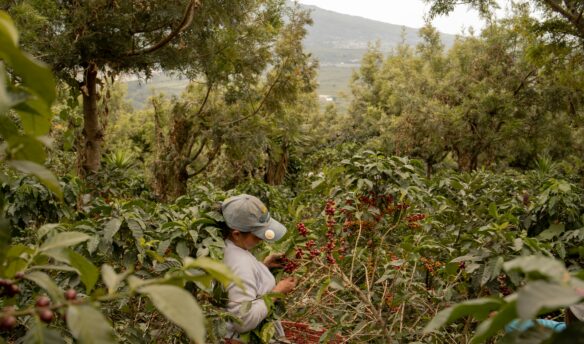Trump’s tariffs rock the coffee industry. Plus, FairWave acquires Black & White and how an electronic nose could help stop coffee fraud.
‘Import Tax on Coffee Pressures US Roasters Already Facing High Prices’ – via Reuters
On April 2, the Trump administration announced sweeping tariffs against most of the United States’ trading partners. While widely anticipated, the scale of the move sent the world economy into turmoil. The tariffs have been widely criticized, with the Financial Times editorial board calling Trump’s announcement “one of the greatest acts of self-harm in American economic history.”
Tariffs are essentially a tax paid, in this case to the U.S. Treasury, by an importing company for goods from a specific area. The costs incurred by a tariff are usually passed on to the consumer, likely meaning price increases for coffee in the U.S.
Under Trump’s proposed plan, nearly every country with which the United States trades will be subject to a baseline 10% tariff. Some countries, including many coffee-producing countries, were slapped with additional tariffs. Goods from China, an emerging coffee-producing country, will see a 54% tariff.
As reported by Marcelo Teixeira for Reuters, some of the world’s largest green coffee exporters face especially steep tariffs:
- Vietnam: 46%
- Indonesia: 32%
- India: 26%
Although there are no additional tariffs on countries like Brazil and Colombia, they are two of the world’s largest coffee exporters, and the baseline 10% is sure to have an impact.
There’s some confusion as to how the tariff numbers were determined. Some have alleged they were devised using generative AI like ChatGPT.
“Vietnam is the big one that sticks out,” Tomas Araujo, a broker at StoneX, told Teixeira about the world’s second-largest coffee producer. “Going forward, it will be a challenge for the supply chain and to end users, with added costs.”
Assuming the tariffs go into effect as announced, the impact on the coffee industry will be extreme. The U.S. is the world’s biggest coffee importer, bringing in 18% of all coffee produced in 2023.
The National Coffee Association has already requested that coffee be exempted from the tariffs because “there is no alternative to imported coffee,” wrote CEO William “Bill” Murray. Judy Ganes from J Ganes Consulting told Teixeira that she expects the industry to continue lobbying: “I personally doubt the tariffs will stick.”
Fresh Cup created a live tool that tracks tariff rates on coffee-producing countries. Check it out here.
‘Black & White Coffee Roasters Joins FairWave Specialty Coffee Collective’ – via World Coffee Portal
The specialty coffee holding company FairWave has continued its expansion across the U.S. by acquiring North Carolina-based Black & White Coffee Roasters.
FairWave, a private equity-backed “collective” based in Kansas City, has acquired numerous specialty coffee companies throughout the Midwest since its founding in 2020. FairWave has 11 other coffee brands under its umbrella, including Missouri’s Messenger Coffee, Minnesota’s Spyhouse Coffee, and Maryland’s Ceremony Coffee Roasters.
Black & White was founded by U.S. Barista Champions Lem Butler and Kyle Ramage in 2017. The brand has grown to include two cafes and a production roastery in Raleigh. Black & White was a finalist in 2023 for Notable Roaster from Sprudge and has been a favorite amongst coffee professionals for its expansive menu of experimentally processed coffees.
Ramage will stay on with Black & White. He called the acquisition “a natural progression that will allow us to build upon our existing foundation and reach new heights” in a press release.
Butler will leave the company “but will remain committed to fostering meaningful and ethical contributions to the specialty coffee industry,” according to the press release.
“We are thrilled to welcome Black & White Coffee Roasters to the FairWave Collective,” said Isaac Hodges, FairWave’s president of growth. “Their innovative approach and dedication to pushing the boundaries of specialty coffee align perfectly with our vision.”
Venture capital and private equity firms have made significant investments in the specialty coffee industry over the past decade. Coffee startups raised $600 million of venture capital funding in just the first seven months of 2018, while private equity firms, which usually invest in more established brands, have also increasingly become involved in the coffee space.
These investments can help companies expand and consolidate, but there have been numerous examples of things going wrong—and workers are particularly at risk when they do.
‘The E-Nose Knows: Identifying A Coffee’s Origin By Volatile Aromatic Compounds’ – via Sprudge
How can you tell where a coffee comes from? Traceability is an important and valued aspect of the industry. In most cases, a bag of coffee will include information about where it’s from, whether a 12 oz bag of roasted beans or a burlap sack of green coffee.
However, there have been several recent high-profile examples of a coffee being marketed as being from one country when it was from another. Just last September, we brought you news of coffees being sold from the coveted Kona region of Hawaii when the bags contained less than 10% of beans from the region.
What if there was a way to know for sure? Maybe there is.
A team of researchers from China and Singapore have developed a method that analyzes volatile compounds in roasted coffee to pinpoint exactly where the coffee was grown.
Over 1000 volatile organic compounds, or VOCs, have been identified in coffee, created during roasting and belonging to different chemical classes like phenols, alcohols, esters, and furans. Together, they contribute to coffee’s flavor and aroma—basically, various combinations are part of what you identify when one cup of coffee tastes different.
For the study, published in Food Chemistry, the researchers used various gas chromatography devices to analyze the volatile compounds in eight roasted coffee samples. They also used something called an electronic nose, which is a fun-sounding sensory device used to accurately detect aromas or flavors. (Sadly, they don’t look like the humanoid robotic noses we pictured when researching this; they’re just metal boxes with a hose attached.)
The researchers identified 12 key markers from hundreds of possible VOCs that could be used to pinpoint a coffee’s origin. Using this data, the team built predictive models to accurately identify which country each of the eight coffees came from.
The approach “provide[s] a foundation for the rapid identification of the origin of roasted coffee beans,” the authors wrote.
Their work builds on several recent studies using e-nose technology to assess coffee. In 2024, Taiwanese researchers developed an e-nose that also identified coffee by its aroma. Going back further, in 2009, Colombian researchers used an e-nose to detect defects in green coffee samples.
More News
‘DMV and Pennsylvania Chocolate & Coffee Festivals Returning in 2025’ – via Daily Coffee News
‘Starbucks and Global FoodBanking Network Announce Partnership’ – via Global Coffee Report
‘Green Coffee Stocks at European Ports are Shrinking, but are Still Higher Than a Year Ago, Says ECF’ – via Comunicaffe
“It’s Not You, It’s the City’: Ritual Coffee to Close Haight-Ashbury Café in San Francisco’ – via San Francisco Chronicle
‘The Legendary Coffee Exchange By Cafe Imports Returns To Expo’ – via Sprudge
The Week in Coffee Unionizing
At Uncommon Grounds in upstate New York, employees have announced their intent to unionize with Workers United. Organizers held a news conference to publicize their efforts, telling Kelsey Brown from the Times Union that they seek pay transparency, better equipment, and improved health and safety standards.
Uncommon Grounds has four cafes in upstate New York, and organizers say the union is composed of workers from the Saratoga Springs and Clifton Park locations. They are hoping to hold elections by the end of April.
The workers said they enjoy working for Uncommon Grounds and want to make it a better environment. “We don’t want to bring the company down,” organizer Casey Moore said. “We actually want to make the company better. But they have a choice to make — respect workers’ rights and do the right thing, or union bust. I don’t think the community will look kindly on union busters.”
Coffee and the Climate Crisis
Farmers in Colombia and Brazil look for innovation to help them adapt and thrive as climate change threatens their farms. However, as two separate stories published this week show, farmers in each country are approaching adaptation differently.
For Reuters, Marcelo Teixeira and Roberto Samora reported that farmers are installing irrigation systems in Brazil to help cope with the drought, which has affected production and pushed coffee prices higher.
Only around 30% of Brazilian coffee farms are currently irrigated. The benefits of an irrigation system are clear: an irrigated farm can produce up to 70 bags per hectare, compared to as few as 20 bags for farms where farmers must rely on rainfall. There is, therefore, a big incentive to install such systems, especially when extended droughts are becoming more common.
However, irrigation systems are expensive and thus only available to the wealthiest farmers, while water tables—underground aquifers that hold groundwater—are so low in some areas of Brazil that some municipalities have restricted irrigation. “I have an irrigation system, but there was no water,” said Mario Alvarenga, a farmer in Minas Gerais.
In more mountainous Colombia, meanwhile, such systems are less suitable. Instead, Victor Raison reports for Mongabay that farmers and researchers are focusing on new hybrid coffee varieties and agroecology techniques to help them adapt to erratic weather patterns.
Cenicafé, the country’s coffee research center, is constantly working on new, more resilient varieties, releasing one called Castillo 2.0 at the end of 2024. Today, the vast majority of Colombian coffee trees are climate-resistant varieties developed by the institute. “It’s like a football team: We have reserve players ready to step in if one is affected,” Cenicafé researcher Claudia Florez said.
At the same time, farmers are also increasingly embracing agroecology techniques to help cope with the heat and drought. Where once they would cut down shade trees to increase yields, now many are restoring the canopy to protect the coffee and planting complementary crops like banana and cacao.
“It’s essential to give back to the soil part of what you take from it with coffee cultivation,” said agronomist Sebastián Velázquez. “If you don’t take care of the soil ecosystem, productivity and plant health decline.”
Beyond the Headlines
‘Against Interpretation (In Coffee)’ by Ashley Rodriguez
‘Column: Let’s Reject the False Dichotomy of Aid or Trade’ by Michael Lewis
‘Starbucks Is Everything Wrong With American Capitalism’ by Nathan J. Robinson













